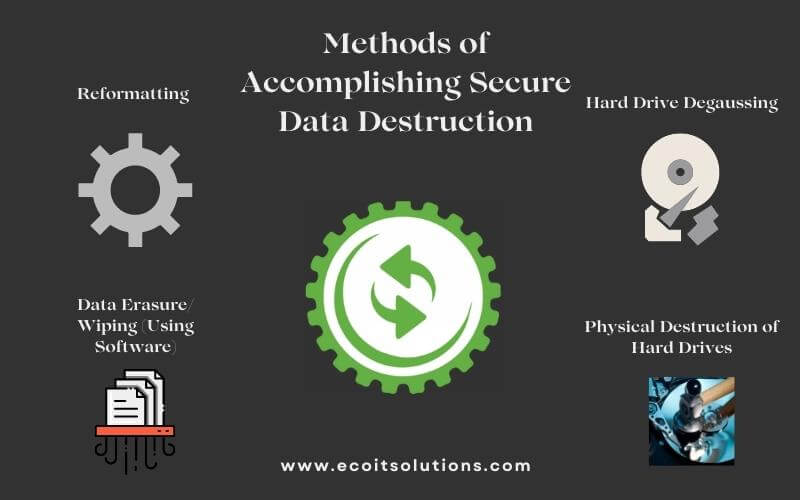The Effect of Effective Data Destruction on Cyber Security Danger Monitoring
The Effect of Effective Data Destruction on Cyber Security Danger Monitoring
Blog Article
Exploring the Importance of Data Destruction in the Context of Computer Safety And Security Services and Protecting Confidential Data
In an era where information violations are significantly common, the value of reliable information damage can not be overstated. Organizations needs to embrace rigid procedures to guarantee that sensitive details is not just shielded throughout its lifecycle however likewise decisively gotten rid of when no more needed. The approaches utilized for information elimination, combined with compliance to lawful requirements, play a critical duty in preserving confidentiality and trust. Nonetheless, the ramifications of these techniques extend past simple conformity, influencing a business's online reputation and operational stability in the digital market. What strategies can companies implement to boost their data damage protocols?
Recognizing Data Damage
Information destruction is a critical component of computer protection that involves the permanent removal of data from storage gadgets to avoid unauthorized gain access to and prospective information breaches. In a progressively electronic landscape, companies encounter heightened dangers connected with sensitive information being improperly accessed or made use of. Efficient data destruction safeguards against these risks, making certain that private dataâEUR" such as client info, intellectual building, and economic recordsâEUR" can not be recouped after disposal.
Recognizing the relevance of information destruction extends beyond mere compliance with legal and governing frameworks; it is important for maintaining organizational integrity and trust. When data is incorrectly managed or inadequately destroyed, the effects can be extreme, including financial loss, reputational damages, and lawful liabilities.

Techniques of Information Removal

One prevalent method is data wiping, which involves overwriting existing data with random patterns multiple times. This method makes the original data irretrievable, making it a prominent option for organizations looking for to secure personal information.
Another method is degaussing, which uses a powerful electromagnetic field to interrupt the magnetic domains on storage devices, properly eliminating the information. This technique is especially efficient for magnetic media but is not applicable to solid-state drives.
Physical destruction is an additional durable technique, squashing or entailing the shredding of storage space devices. This method warranties that information healing is virtually difficult, making it excellent for very sensitive information.
Last but not least, security can work as a complementary strategy to data obliteration. By encrypting data before deletion, companies can include an added layer of safety, guaranteeing that also if residues are recovered, they continue to be unattainable without the decryption key. Each approach ought to be chosen based upon the level of information sensitivity and the details safety requirements of the company.
Legal Compliance and Information Security
Organizations must navigate a complicated landscape of legal demands related to information security, particularly after implementing techniques of information elimination. Numerous policies, such as the General Information Protection Guideline (GDPR) and the Medical Insurance Portability and Responsibility Act (HIPAA), enforce stringent guidelines on just how organizations need to get rid of and take care of of sensitive data. Failing to adhere to these policies can cause significant legal effects, including considerable penalties and reputational damages.
Data damage procedures need to be diligently documented to demonstrate compliance with relevant laws and requirements. This documents not only offers as proof of adherence to legal responsibilities yet additionally illustrates a commitment to securing sensitive info. Organizations needs to likewise establish clear policies regarding data retention and damage timelines, guaranteeing that data is not held longer than needed.

In addition, normal audits and analyses of information damage practices are vital to maintain conformity and adjust to developing legal structures (data destruction). By proactively resolving lawful requirements, companies can mitigate threats linked with data breaches and show their commitment to data protection. Eventually, prioritizing lawful go to website compliance in data devastation processes is not simply a regulative obligation, yet an essential aspect of a durable data security approach
Influence On Business Track Record
The credibility of a business can be dramatically affected by its approach to information destruction and monitoring. In today's digital landscape, where information breaches can take place at any type of minute, the failing to properly dispose of sensitive info can lead to serious repercussions. Organizations that inadequately pop over to this web-site take care of data devastation risk subjecting personal customer details, which not only breaks personal privacy laws however additionally erodes depend on among stakeholders and customers.
A tarnished track record can cause decreased client commitment, as clients end up being reluctant to involve with a company that has actually demonstrated oversight in protecting their data. In addition, negative attention surrounding a data breach can have a long lasting impact, as possible consumers could be discouraged by the viewed absence of protection. This can bring about a straight decrease in earnings and market share.
Moreover, businesses that prioritize information devastation as component of their protection approach can boost their online reputation by showcasing their dedication to guarding delicate info. By embracing rigid data administration practices, organizations can not just mitigate risks yet additionally place themselves as credible entities in their respective industries, thereby reinforcing their total brand image.

Best Practices for Secure Disposal
Applying finest practices for safe and secure disposal of information is important for mitigating risks connected with information breaches and ensuring conformity with privacy laws. Organizations ought to take on a detailed data disposal plan that outlines treatments for both electronic and physical information damage.
For physical information storage tools, Clicking Here such as difficult drives, shredding or degaussing is advised to avoid information healing. In addition, organizations need to maintain a chain of guardianship documents during the disposal procedure, ensuring liability and traceability of disposed items.
For electronic data, utilizing software program that adheres to market criteria for data cleaning is crucial. This software application needs to overwrite existing data several times, making recuperation virtually difficult. It is additionally important to confirm the performance of the information destruction process with audits or third-party assessments.
Educating employees on safe disposal techniques adds one more layer of safety, as human mistake can often result in information direct exposure. On a regular basis updating and evaluating disposal policies makes certain positioning with advancing regulations and technological developments. By carrying out these finest techniques, companies can dramatically reduce the threat of unapproved information accessibility and boost their total information defense strategy.
Final Thought
Finally, data devastation is a basic facet of computer system security solutions that ensures the protection of confidential information from unauthorized access. Executing effective techniques of data eradication, adhering to lawful conformity, and identifying the influence on service credibility are important components of a comprehensive information safety technique. By adopting ideal techniques for protected disposal, organizations can cultivate depend on with clients and guard delicate data, ultimately adding to a much more secure electronic landscape.
In an age where information violations are increasingly usual, the value of efficient data destruction can not be overemphasized.Data devastation is a critical part of computer security that includes the permanent elimination of information from storage tools to avoid unapproved access and possible data violations. Organizations should additionally establish clear plans relating to data retention and devastation timelines, guaranteeing that data is not held longer than required.
By proactively dealing with lawful needs, organizations can mitigate risks associated with information violations and demonstrate their commitment to data security (data destruction). Inevitably, focusing on legal compliance in information devastation procedures is not simply a regulative commitment, however a fundamental aspect of a robust data protection strategy
Report this page